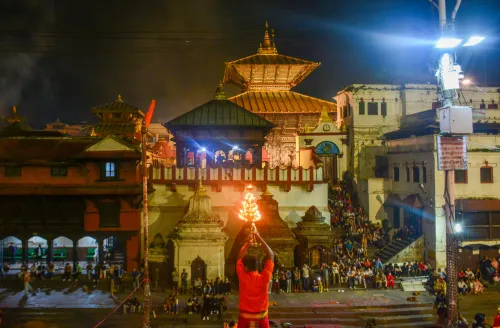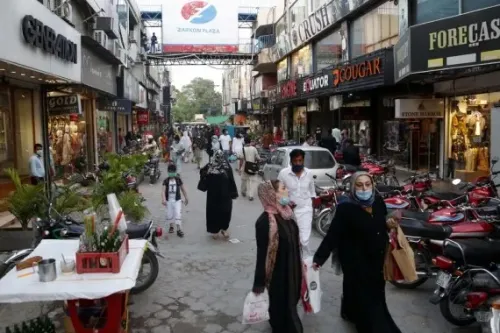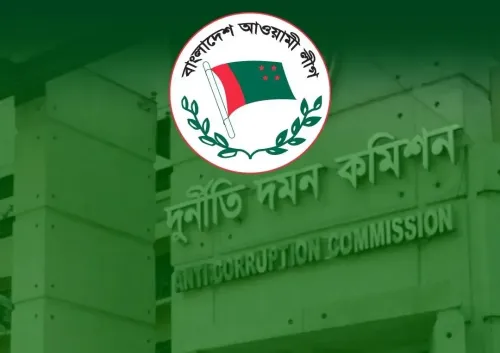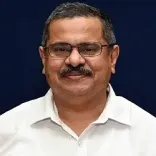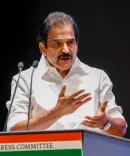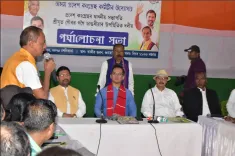How are PM Modi and Ishiba Strengthening India-Japan Defence Ties?
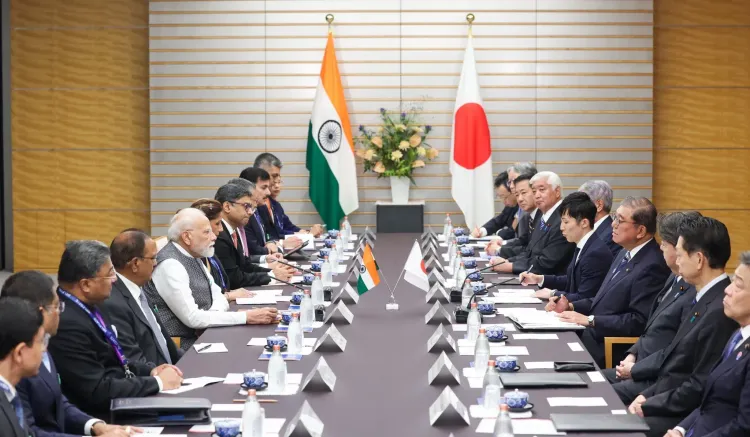
Synopsis
Key Takeaways
- Strengthened Defence Cooperation: Enhanced collaboration between India and Japan in the defence industry and technology.
- Commitment to Indo-Pacific Stability: Both nations reaffirm their dedication to a free and open Indo-Pacific region.
- Human Resource Exchange Initiative: A plan to encourage the movement of 500,000 individuals over five years.
- Focus on Innovation: Joint efforts in developing next-generation defence platforms.
- Economic Partnerships: Avenues for trade, tourism, and cultural exchange are set to deepen.
Tokyo, Aug 29 (NationPress) Prime Minister Narendra Modi on Friday reiterated the unwavering commitment of India and Japan to a free, open, peaceful, prosperous, and rules-based Indo-Pacific while announcing a decision to enhance collaboration in the defence sector and technological innovation.
During a joint press conference with his Japanese counterpart, Shigeru Ishiba, after the 15th India-Japan Annual Summit, PM Modi emphasized, "India and Japan are wholly devoted to a free, open, peaceful, prosperous, and rules-based Indo-Pacific. We share common concerns regarding terrorism and cybersecurity. Our mutual interests are closely tied to Defence and Maritime Security. We have resolved to further bolster cooperation in the defence sector and innovation."
In a prior interview with the prominent Japanese newspaper 'The Yomiuri Shimbun' before his Tokyo visit, PM Modi highlighted the successful collaboration in the defence field as a strong narrative for both countries, noting their shared commitment to the peace, security, and stability of the Indo-Pacific.
"Currently, our partnership encompasses all three military branches. We conduct frequent bilateral and multilateral exercises. We are developing a robust Defence Equipment and Technology Cooperation framework and working together on the co-development and co-production of UNICORN masts for our Navy," he stated.
The Prime Minister pointed out that in recent years, Indian defence products have been rapidly expanding their international presence.
"Japan has a solid track record in defence technology. With political trust and natural synergies, we have the potential to design and manufacture next-generation defence platforms for not just ourselves, but for the global market as well. The Joint Declaration on Security Cooperation, which will be formalized during my visit, will enhance military modernization and defence industry collaboration, aligning with our vision for a secure and stable Indo-Pacific for future generations," he told Yomiuri Shimbun.
On Friday, PM Modi extended an invitation to Ishiba for the next India-Japan Annual Summit, underlining that the partnership is grounded in mutual trust and shaped by shared values and beliefs. He praised the agreement established between the Japan Aerospace Exploration Agency (JAXA) and the Indian Space Research Organisation (ISRO) for collaboration on the Chandrayaan-5 mission.
"The partnership between India and Japan is rooted in mutual trust, reflects our national priorities, and is shaped by our shared values and beliefs. Together, we share a common aspiration for the peace, progress, and prosperity of our peoples and the world," he expressed.
PM Modi labeled his discussions with Ishiba as "productive and meaningful." He added, "As the world's two largest economies and vibrant democracies, our partnership is crucial not only for our nations but also for global peace and stability."
He also declared a plan for human resource exchanges between the two nations, stating, "Under the human resource exchange action plan, we aim to facilitate the movement of 500,000 individuals from both sides across various sectors over the next five years, with 50,000 skilled Indians expected to contribute actively to Japan's economy."
"The collaboration between India and Japan will not be confined to Delhi and Tokyo alone. Now, the relationship between Indian states and Japanese prefectures will strengthen through institutional cooperation, unlocking new opportunities in trade, tourism, education, and cultural exchange," he added.
PM Modi announced that India and Japan would make swift advancements in sectors such as ports, aviation, and shipbuilding through the Next Generation Mobility Partnership. He referred to the India-Japan joint credit mechanism as a "significant achievement" for energy and also unveiled the launch of the Sustainable Fuels Initiative and Battery Supply Chain Partnership.
"Our Joint Credit Mechanism represents a significant win for energy. It illustrates that our green partnership is as robust as our economic partnership. In this context, we are also launching the Sustainable Fuels Initiative and the Battery Supply Chain Partnership. We are initiating the Economic Security Cooperation Initiative, moving forward with a comprehensive strategy in crucial and strategic domains," he remarked.
Referring to Indian talent and Japanese technology as a "winning combination," PM Modi stated, "We are confident that Japanese technology and Indian talent form a winning combination. While we progress on high-speed rail, we will also make swift advancements in sectors like ports, aviation, and shipbuilding through the Next Generation Mobility Partnership. We welcome the agreement reached between ISRO and JAXA regarding the Chandrayaan-5 mission. Our active involvement will transcend earthly boundaries, becoming a symbol of humanity's progress in space as well," he emphasized.
PM Modi's statements followed his 15th India-Japan Annual Summit with Japanese counterpart Ishiba at Kantei, the official residence of the Prime Minister of Japan. The meeting was attended by Foreign Secretary Vikram Misri, National Security Advisor (NSA) Ajit Doval, Indian Ambassador to Japan Sibi George, and other officials.
Upon arrival for the 15th India-Japan Annual Summit discussions, PM Modi received a ceremonial welcome and Guard of Honour at Kantei. Earlier that day, PM Modi and Ishiba addressed the India-Japan Economic Forum where CEOs and business leaders from various sectors participated. In his speech, PM Modi elaborated on India's profound economic ties with Japan and discussed areas for potential cooperation between the two nations in the future.


